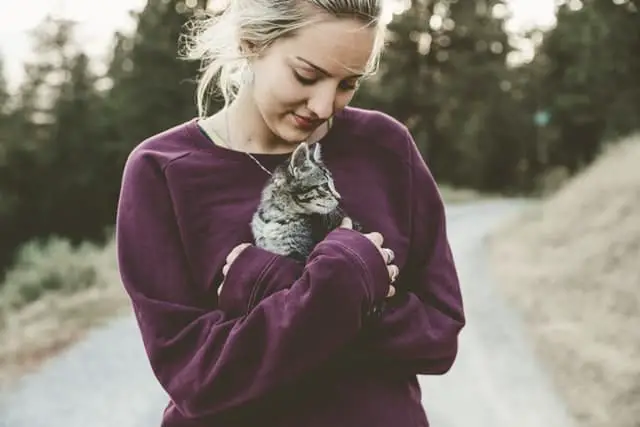
There are some irrefutable signs to identify a cat overly dependent on its owner: here’s how to tell if your cat is clingy and just wants to give you unconditional love.
After spending a long day away from home at work, in the company of people you don’t always like, going home to your cat is probably the most enjoyable thing in the world: even more so if you know you will find a loving cat waiting for you, very attached to you and waiting for nothing but to be in your company!
Sometimes, the unconditional love of a cat can really surprise us: we are used to thinking that dogs are more affectionate than cats, but those lucky enough to have a cat that is a bit clingy know how cuddly and loving it can be.
However, the step between an affectionate cat and a cat that is clingy to the point of being too dependent on its owner is very short: so here are 10 signs to keep an eye on.
10 signs of clingy behavior in cats
1. The cat is your shadow
If you risk tripping over your cat at least once a week and are used to always looking down when walking around the house to avoid stepping on your cat … your cat is probably getting a little too clingy. You have to be careful and understand why the cat follows you wherever you go.
2. The cat never leaves you alone
Cats love to have their attention focused on themselves and have a tendency to be particularly affectionate when their owner is asleep or busy watching TV – this is their way of getting noticed when you are busy doing other things. Be careful, however, that this behavior does not exceed: it could be very difficult to manage.
3. The cat does not eat if you are not there
Among the possible symptoms of an overly dependent cat, one of the most troubling is the cat’s habit of not eating unless its favorite human is present. If your cat tends not to look at the bowl when you are not at home, it is likely that he suffers from separation anxiety – a very common problem among cats.
4. The cat sleeps on you
Whatever the current season, whether there is a cold winter or a hot summer, the cat is always on you: a real walking furry blanket, perpetually lying on your legs when you are on the sofa or in bed. Sometimes, the cat even trespasses on your pillow : be careful, he is clearly a clingy cat and too much in need of attention.
5. The cat meows too much
Among the typical behaviors of a clingy cat there is also excessive meowing: a cat that meows a lot probably does it to attract attention. Definitely annoying when you are at home, it becomes a real problem if the cat meows when you go out: again, the basic problem is almost certainly separation anxiety.
6. The cat doesn’t want you to move
A clingy cat has a habit of deciding where you need to be: sitting, standing, lying … Whatever position you choose, it must receive its approval! The addicted cat is an even more habitual cat and does not admit that you can choose a different chair or armchair than usual.
7. The cat is scared
Very often cats react negatively to strangers: some are totally indifferent and pretend they don’t exist, others feel incredibly insecure and immediately flee to hide. If every time you are in the company of guests your cat sticks firmly on your feet or your legs, he is definitely a cat too dependent on the owner.
8. The cat is very demanding
If the cat wants to be petted continuously and, when you do, you see that it purrs very loudly and enters a state of deep relaxation, it could certainly be pleasant for both of you: however, if the kitten wants to be petted every time you do it. sit down, there may be a morbid attachment problem.
9. The cat is manipulative
Usually, when cats want something they know how to ask for it so insistently that they are almost always satisfied: this behavior, however, is often misrepresented by cats as an excuse to always get what they want. Beware of the way my cat asks you for something: sometimes, behind a sticky cat there is a real manipulator!
10. The sad cat for goodbye
Cats are animals of habit and soon learn to recognize the signs of a repeating routine: when your cat suffers from separation anxiety, he will learn to recognize your behaviors before going out such as taking the keys, the bag and the coat and will start to rub near your legs to try to convince you not to leave him alone.
What to do if the cat is too clingy?

If the cat has become too clingy, it is good to intervene as soon as possible because it is highly likely that the problem has turned into something deeper, such as addiction or separation anxiety. Usually these disorders are typical of cats who have experienced a traumatic change, such as a move, a divorce, a bereavement in the family.
Before labeling your cat as suffering from an anxiety disorder, it is important to contact your vet first: some of the signs listed above could be a sign of a health problem. Once medical causes have been ruled out, it is important to provide your cat with alternatives to lower anxiety and stress levels.
Among these, we can certainly remember a comfortable and safe place to rest, a scratching post to get your nails done and release tension, games suitable to stimulate your curiosity and your intellect. Finally, let’s never forget that a cat needs attention and spending time with friends: we dedicate time every day to cuddling, but also to play with our feline friend. It is likely that, by lowering the level of anxiety, the cat will stop being clingy and will return to being affectionate in a balanced way.






